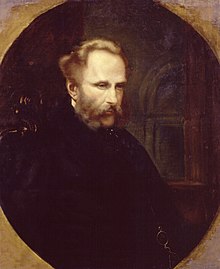Alexander William Kinglake
Alexander William Kinglake | |
|---|---|
 1863 portrait by Harriet M. Haviland | |
| Born | 5 August 1809 |
| Died | 2 January 1891 (aged 81) |
| Nationality | English |
| Education |
|
| Occupation(s) | Travel writer, historian |
Alexander William Kinglake (5 August 1809 – 2 January 1891) was an English travel writer and historian.
He was born near Taunton, Somerset, and educated at Eton College and Trinity College, Cambridge.[1] He was called to the Bar in 1837,[2] and built up a thriving legal practice, which, in 1856, he abandoned to devote himself to literature and public life.
His first literary venture was Eothen; or Traces of travel brought home from the East (London:
Napoleon III
for whom the author had an extreme aversion.
The town of Kinglake in Victoria, Australia,[4] and the adjacent national park are named after him.
A
Royal Commission found that there had been extensive corruption, the town was disenfranchised in 1870.[5][6]
In the late 1880s he developed cancer of the throat, and he died on 2 January 1891.
Notes
- ^ "Kinglake, Alexander William (KNGK828AW)". A Cambridge Alumni Database. University of Cambridge.
- ^ Stephen, Leslie (1892). . In Lee, Sidney (ed.). Dictionary of National Biography. Vol. 31. London: Smith, Elder & Co.
- ^ Introduction to Eothen: Traces of Travel Brought Home from the East, Northwestern University Press, 1 Apr 1997
- ^ "Pioneers honored". The Age. 6 September 1977. p. 3. Retrieved 28 April 2015.
- ISBN 0-900178-26-4.
- ^ "Alexander William Kinglake". Paul Frecker. Retrieved 24 September 2012.
References
- "Kinglake National Park". Print Version. Parks Victoria. 1 August 2001. Archived from the original on 30 August 2007. Retrieved 1 November 2007.
 This article incorporates text from a publication now in the public domain: Cousin, John William (1910). A Short Biographical Dictionary of English Literature. London: J. M. Dent & Sons – via Wikisource.
This article incorporates text from a publication now in the public domain: Cousin, John William (1910). A Short Biographical Dictionary of English Literature. London: J. M. Dent & Sons – via Wikisource.- Drabble, M. (ed.) (1983) The Oxford Companion to English Literature. Oxford: U. P.; p. 534
External links
Wikimedia Commons has media related to Alexander William Kinglake.
- Hansard 1803–2005: contributions in Parliament by Alexander Kinglake
- Works by Alexander William Kinglake at Project Gutenberg
- Works by or about Alexander William Kinglake at Internet Archive
- Works by Alexander William Kinglake at LibriVox (public domain audiobooks)

- Works by Alexander William Kinglake at Open Library
- The Invasion of the Crimea, vol1 - vol2 - vol3 - vol4 - vol5 - vol6 - vol7 - vol8 - vol9
